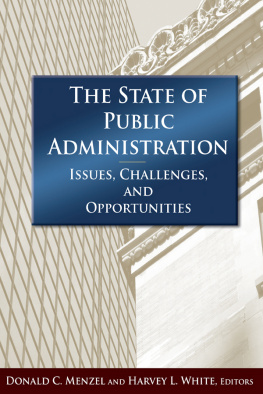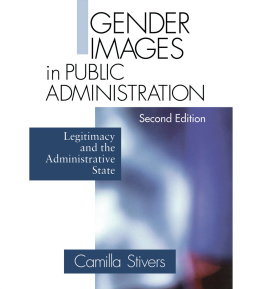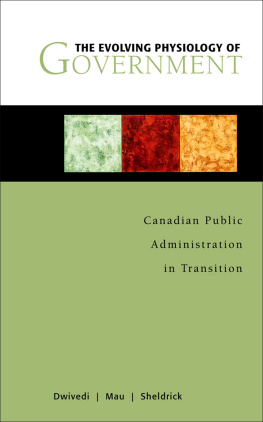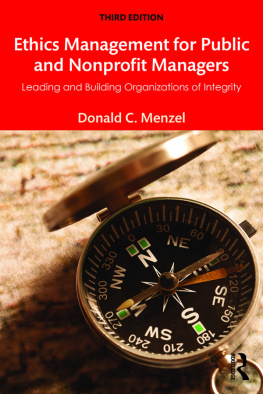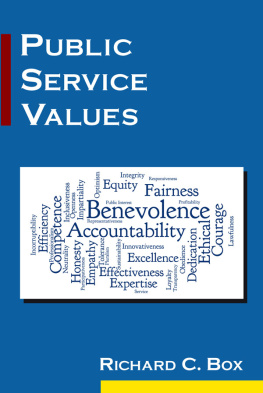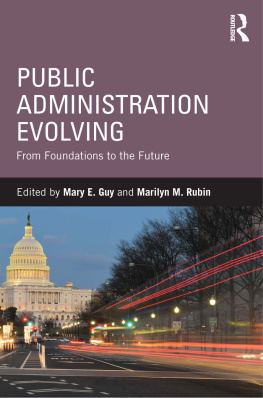THE STATE OF PUBLIC ADMINISTRATION
THE STATE OF PUBLIC ADMINISTRATION
ISSUES, CHALLENGES, AND OPPORTUNITIES
DONALD C. MENZEL AND HARVEY L. WHITE, EDITORS

First published 2011 by M.E. Sharpe
Published 2015 by Routledge
2 Park Square, Milton Park, Abingdon, Oxon OX14 4RN
711 Third Avenue, New York, NY 10017, USA
Routledge is an imprint of the Taylor & Francis Group, an informa business
Copyright 2011 Taylor & Francis. All rights reserved.
No part of this book may be reprinted or reproduced or utilised in any form or by any electronic, mechanical, or other means, now known or hereafter invented, including photocopying and recording, or in any information storage or retrieval system, without permission in writing from the publishers.
Notices
No responsibility is assumed by the publisher for any injury and/or damage to persons or property as a matter of products liability, negligence or otherwise, or from any use of operation of any methods, products, instructions or ideas contained in the material herein.
Practitioners and researchers must always rely on their own experience and knowledge in evaluating and using any information, methods, compounds, or experiments described herein. In using such information or methods they should be mindful of their own safety and the safety of others, including parties for whom they have a professional responsibility.
Product or corporate names may be trademarks or registered trademarks, and are used only for identification and explanation without intent to infringe.
Library of Congress Cataloging-in-Publication Data
The state of public administration : issues, challenges, and opportunities / edited by Donald C. Menzel and
Harvey L. White.
p. cm.
Includes bibliographical references and index.
ISBN 978-0-7656-2504-5 (hardcover : alk. paper) ISBN 978-0-7656-2505-2 (pbk. : alk. paper)
1. Public administrationUnited States. 2. Administrative agenciesUnited StatesManagement.
3. Executive departmentsUnited StatesManagement. I. Menzel, Donald C. II. White, Harvey L.
JK421.S718 2011
351.73dc22 2010022573
ISBN 13: 9780765625052 (pbk)
ISBN 13: 9780765625045 (hbk)
CONTENTS
Richard Stillman
Donald C. Menzel and Harvey L. White
Laurence E. Lynn Jr.
James S. Bowman and Jonathan P. West
Patricia M. Shields and Nandhini Rangarajan
Wendy Haynes and Beth Gazley
Jeffrey A. Raffel, Steven M. Maser, and Crystal Calarusse
Montgomery Van Wart
Donald C. Menzel
Norma M. Riccucci
Irene S. Rubin
Judith R. Saidel
Melvin J. Dubnick and Kaifeng Yang
Stuart I. Bretschneider and Ines Mergel
William L. Waugh
Nicholas Henry
Terry L. Cooper
Louise K. Comfort, Clayton Wukich, Steve Scheinert, and Leonard J. Huggins
Robert Agranoff
Deil S. Wright, Carl W. Stenberg, and Chung-Lae Cho
Beverly A. Cigler
Robert F. Durant and John Marvel
Stephen E. Condrey and Jonathan P. West
David H. Rosenbloom
Harvey L. White
Alan Lawton and Frdrique Six
Jamil Jreisat
Louis A. Picard
David Schultz
RICHARD STILLMAN
Editor-in-Chief
Public Administration Review
University of Colorado
The past decade witnessed one of the most turbulent eras in American history. Indeed, it ranks among the top ten cataclysmic epochsthe Revolutionary War in the 1770s, the ratification of the U.S. Constitution in the 1780s, the Jacksonian populist movement of the 1820s, the American Civil War in the 1860s, the Progressive reforms and World War I in the 1910s, the Great Depression of the 1930s, World War II and the start of the Cold War in the 1940s, and civil rights, feminist rights, and gay liberation movements of the 1960s. The decade of 20002010 rightly belongs in the record books as another rare period reflecting enormous historic transformations. The decade opened with the controversial, razor-close 2000 presidential election, which spawned a national crisis involving the nations very constitutional legitimacy; the 9/11 terrorist attacks, which sparked a global war on terrorism; the double whammy of the dot-com meltdown and the housing-bubble bust, which ushered in the worst economic crisis since the Great Depression; and, of course, the unforgettable Katrina tragedy.
At the heart of all these socioeconomic-political-military shocks stood public administration for good or ill, or for good AND ill. Yes, ill because the 2000 Florida election hung in perilous balance precisely due to inconsistencies in how county elections designed ballots and how they counted votes. In the case of 9/11, the hijackers slipped under the FBI radar screen because bureau field agents in Minnesota and Arizona could not convince their superiors at Washington headquarters that the threats they reported were real and imminent. Regulatory management at every governmental level was lax and negligent, thus precipitating market excesses that brought both the domestic and global economies to their knees. Unquestionably, the lengthy chain of federal-state-local mismanagement and faulty planning contributed directly to the deaths of more than a thousand people and the destruction of a trillion dollars-plus worth of property in the wake of Katrina.
Still, abundant good resulted from public administration actions throughout the decade. Votes were counted (for the most part) correctly in 2008, resulting in the election of Americas first African-American president. Two far-flung wars were fought in Iraq and Afghanistan thanks to the courage and professionalism of many brave men and women in the U.S. Armed Forces. A rapid response by the Federal Reserve and Treasury dramatically blunted the free fall of the U.S. and world economies. Universal health care was for the first time successfully debated, enacted, and its implementation began.
At the core of all these momentous crises stood public administration, intricately and intimately. Making government workor failis the essence of public administration. Whether we are consciously aware of it or not, public administration decisively shapes and reshapes modern life and contemporary events, with innumerable apparent and not-so-apparent consequences.
Yet, what is public administration today, given that it is everywhere and influences everything in modern society? How can we comprehend its key trends as well as unforeseen consequences? How do we ensure that it serves the public? After all, is not public the first word in public administration?
Professors Donald C. Menzel and Harvey L. White, both former presidents of the American Society for Public Administration (Americas premier professional association of administrative academics and practitioners), edited this remarkable book, which examines the state of the field; a field at the heart of myriad, complicated, even life-and-death domestic and worldwide challenges at the dawn of the twenty-first century. Wisely, the editors recruited more than thirty of the best and brightest administrative scholars to think deeply and broadly about critical public administration issues: What are the new challenges as well as opportunities facing public administration? What are the underlying factors influencing new or emerging trends? What priority issues remain unsolved and why? What do we know and not know about this seminal subject?
Next page
